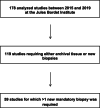Analyses of the Rationale and Implementation of Research Biopsies in Oncology Clinical Trials at a Tertiary Cancer Center
- PMID: 34286890
- PMCID: PMC8649004
- DOI: 10.1002/onco.13906
Analyses of the Rationale and Implementation of Research Biopsies in Oncology Clinical Trials at a Tertiary Cancer Center
Abstract
Background: Biomarkers in clinical trials have led to massive incorporation of research biopsies, with potentially risks and no direct benefit for patients. In 2018, the American Society of Clinical Oncology (ASCO) released an ethical framework to provide guidance on incorporating research biopsies in cancer clinical trials.
Materials and methods: We collected biopsy requirements of cancer clinical trials conducted at Institut Jules Bordet (IJB) between 2015 and 2019 to examine adherence with the ASCO Ethical Framework. We used logistic regression models to test the association between the request for biopsy, the request for tissue, and the adherence to the ASCO framework as well as some trial characteristics.
Results: Between January 2015 and December 2019, 178 oncological studies were conducted at IJB. Of these, 138 (78%) were sponsored by industry, 132 (74%) were phase II and III studies, and 141 (79%) concerned metastatic disease. Tissue was required for inclusion for 119 (67%) studies, among which 59 required at least one new biopsy. Adherence to ASCO's Ethical Framework was 67% for studies requiring tissue and went down to 39% for studies requiring at least one new biopsy. In multivariate analysis, requests for tissue or new biopsies increased in early-phase studies (p < .001, p < .001, respectively) and in studies investigating innovative treatments (immunotherapy or targeted therapies; p < .01, p = .02). Compliance to the ASCO framework significantly decreased with time (p < .001) and in early-phase studies (p < .001).
Conclusion: Numerous studies required tissue or new biopsies for exploratory objectives of unknown clinical utility. Requests for tissue increased over the years, whereas compliance to ASCO's Ethical Framework decreased.
Implications for practice: In 2019, the American Society of Clinical Oncology (ASCO) developed an ethical framework to provide guidance on incorporating research biopsies in clinical trials. This study underlines the growing request for tissue in clinical trials with potentially no impact on drug development and no benefit to actual or future patients. Adherence to ASCO's Ethical Framework decreases through time. These results highlight the importance of improving the ethics of research biopsies. ASCO's Ethical Framework offers an opportunity to improve quality of care in clinical research by maximizing scientific utility and allowing for clinically meaningful correlative science and safe access to innovative treatments for a maximum number of patients.
Keywords: Biopsy; Clinical trial; Medical oncology; Research ethics.
© 2021 AlphaMed Press.
Conflict of interest statement
Comment in
-
Implications of Research Biopsies in Clinical Trials.Oncologist. 2021 Dec;26(12):994-996. doi: 10.1002/onco.13948. Epub 2021 Aug 31. Oncologist. 2021. PMID: 34418217 Free PMC article.
Similar articles
-
Ethical Framework for Including Research Biopsies in Oncology Clinical Trials: American Society of Clinical Oncology Research Statement.J Clin Oncol. 2019 Sep 10;37(26):2368-2377. doi: 10.1200/JCO.19.01479. Epub 2019 Jul 25. J Clin Oncol. 2019. PMID: 31343905
-
American Society of Clinical Oncology provisional clinical opinion: the integration of palliative care into standard oncology care.J Clin Oncol. 2012 Mar 10;30(8):880-7. doi: 10.1200/JCO.2011.38.5161. Epub 2012 Feb 6. J Clin Oncol. 2012. PMID: 22312101
-
Clinical cancer advances 2011: Annual Report on Progress Against Cancer from the American Society of Clinical Oncology.J Clin Oncol. 2012 Jan 1;30(1):88-109. doi: 10.1200/JCO.2011.40.1919. Epub 2011 Dec 5. J Clin Oncol. 2012. PMID: 22147736
-
American Society of Clinical Oncology provisional clinical opinion: testing for KRAS gene mutations in patients with metastatic colorectal carcinoma to predict response to anti-epidermal growth factor receptor monoclonal antibody therapy.J Clin Oncol. 2009 Apr 20;27(12):2091-6. doi: 10.1200/JCO.2009.21.9170. Epub 2009 Feb 2. J Clin Oncol. 2009. PMID: 19188670 Review.
-
An Expanded Role for IRBs in the Oversight of Research Biopsies.Ethics Hum Res. 2022 Sep;44(5):32-41. doi: 10.1002/eahr.500141. Ethics Hum Res. 2022. PMID: 36047275 Review.
Cited by
-
From ownership to custodianship of tumor biopsy tissue in genomic testing: a mixed methods study of patient views.Oncologist. 2024 Sep 6;29(9):e1169-e1179. doi: 10.1093/oncolo/oyae074. Oncologist. 2024. PMID: 38713191 Free PMC article.
-
Implications of Research Biopsies in Clinical Trials.Oncologist. 2021 Dec;26(12):994-996. doi: 10.1002/onco.13948. Epub 2021 Aug 31. Oncologist. 2021. PMID: 34418217 Free PMC article.
References
-
- U.S. Department of Health and Human Services, Food and Drug Administration Biomarker Qualification: Evidentiary Framework Guidance for Industry and FDA Staff. 2018. Available at https://www.fda.gov/regulatory-information/search-fda-guidance-documents.... Accessed August 13, 2020.
-
- Freeman GA, Kimmelman J. Publication and reporting conduct for pharmacodynamic analyses of tumor tissue in early‐phase oncology trials. Clin Cancer Res 2012;18:6478–6484. - PubMed
-
- Goulart BHL, Clark JW, Pien HH et al. Trends in the use and role of biomarkers in phase I oncology trials. Clin Cancer Res 2007;13:6719–6726. - PubMed
-
- Beaver JA, Ison G, Pazdur R. Reevaluating eligibility criteria — Balancing patient protection and participation in oncology trials. N Engl J Med 2017;376:1504–1505. - PubMed
MeSH terms
LinkOut - more resources
Full Text Sources
Medical


